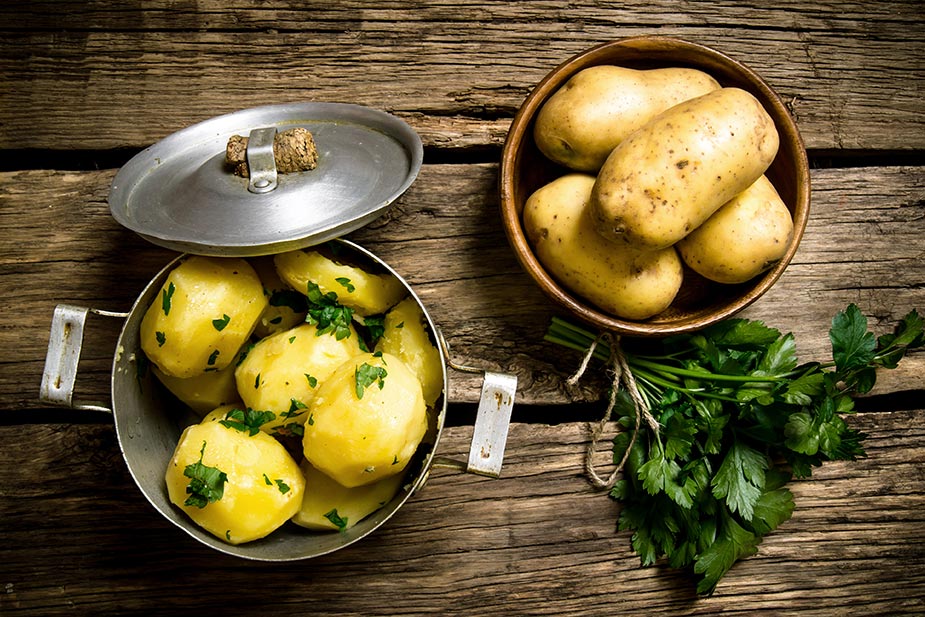In this article, we’ll explain what the potato diet is, how it works, and how to safely incorporate it into your weight loss and detoxification journey. We’ll also discuss the benefits and potential drawbacks of the diet, as well as tips for maintaining long-term weight loss and overall health.
What is the Potato Diet?
The potato diet is a short-term diet plan that involves consuming primarily potatoes and yogurt for a period of three to 14 days. The idea behind the diet is that potatoes are a low-calorie and filling food that can help you lose weight and detoxify your body. While the potato diet is often associated with extreme weight loss, it’s important to approach the diet with caution and to maintain a healthy and balanced diet after the diet is over.
How Does the Potato Diet Work?
The potato diet works by restricting your caloric intake to a minimum, while providing your body with essential nutrients and fiber. Potatoes are high in fiber, which helps regulate digestion and can keep you feeling full for longer periods of time. Additionally, potatoes are a good source of vitamin C, potassium, and other important nutrients.
To follow the potato diet, you’ll need to eat boiled potatoes for breakfast, lunch, and dinner, along with non-fat yogurt. You can also add some herbs and spices for flavor, but avoid using oils, butter, or other high-calorie toppings.
By restricting your caloric intake to potatoes and yogurt, you can lose weight quickly, but it’s important to follow the diet for a short period of time and to maintain a healthy and balanced diet after the diet is over.
The Three-Day Potato Diet Plan
The three-day potato diet plan is a strict and restrictive diet that should only be followed for the recommended three days. This plan involves eating boiled potatoes and drinking non-fat yogurt for breakfast, lunch, and dinner. You can also eat some fruit, vegetables, and lean protein to supplement your diet, but avoid processed foods, sugary drinks, and high-calorie snacks.
The three-day potato diet plan can help you lose up to five pounds of excess water weight and waste, but it’s important to maintain a healthy and balanced diet after the three-day period. To avoid the yo-yo effect and regain weight after the diet, focus on consuming a variety of healthy foods, reducing your intake of sugary and processed foods, and exercising regularly.
Here’s how to follow the three-day potato diet plan:
Day 1:
- Breakfast: One boiled unsalted potato and a glass of fat-free yogurt.
- Lunch: Two boiled unsalted potatoes and a glass of fat-free yogurt.
- Dinner: Two glasses of fat-free yogurt.
Day 2:
- Breakfast: One glass of fat-free yogurt.
- Lunch: Two boiled unsalted potatoes and a glass of fat-free yogurt.
- Dinner: One boiled unsalted potato and a glass of fat-free yogurt.
Day 3:
- Breakfast: One boiled unsalted potato.
- Lunch: One boiled unsalted potato and a glass of fat-free yogurt.
- Dinner: One glass of fat-free yogurt.
It’s essential to drink plenty of water during the three-day potato diet plan to stay hydrated and aid in the detoxification process. While this diet plan is safe for most people, it’s important to consult with your healthcare provider before starting any new diet or exercise plan.
Remember, the three-day potato diet plan is a short-term diet plan designed to jumpstart your weight loss journey. To achieve long-term weight loss and overall health, it’s crucial to maintain a balanced and healthy diet and regular exercise routine after the three days are over.
Longer-Term Potato Diet Plans
For those who want to try a longer-term potato diet, there are seven-day and 14-day plans available. These plans involve eating more potatoes and incorporating a limited variety of other healthy foods into your diet. For example, you can eat some fruits, vegetables, lean protein, and nuts, but avoid processed foods, sugary drinks, and high-calorie snacks.
It’s important to consult a healthcare professional before attempting any longer-term diet plan. Longer-term diets can be more challenging to follow, and they may not be suitable for everyone. It’s also important to maintain a healthy and balanced diet after the diet is over, to avoid the yo-yo effect and regain weight.
Benefits and Drawbacks of the Potato Diet
The potato diet can be a helpful tool in your weight loss and detoxification journey, but it does have some potential drawbacks. One of the main drawbacks is that the diet can be too restrictive and challenging to follow for long periods of time. Additionally, the diet may not
provide all the necessary nutrients for optimal health, and it may cause nutrient deficiencies if followed for an extended period of time.
On the other hand, the potato diet has several benefits. For one, it’s a low-cost and accessible diet plan that can be easily incorporated into your daily routine. Additionally, potatoes are a nutritious food that can provide your body with essential vitamins, minerals, and fiber.
The diet can also help jumpstart your weight loss and detoxification journey, providing motivation and momentum for long-term success.
Maintaining Long-Term Weight Loss and Overall Health
After completing the potato diet, it’s important to maintain a healthy and balanced diet to avoid the yo-yo effect and regain weight. This can be achieved by consuming a variety of nutrient-dense foods, such as fruits, vegetables, lean protein, whole grains, and healthy fats. You should also reduce your intake of processed and sugary foods, and drink plenty of water to stay hydrated.
In addition to maintaining a healthy diet, regular exercise can also help you maintain long-term weight loss and overall health. Aim for at least 30 minutes of moderate-intensity exercise per day, such as walking, cycling, or swimming. Strength training exercises can also help build lean muscle mass and boost your metabolism.
Conclusion
In conclusion, the potato diet can be a useful tool for jumpstarting your weight loss and detoxification journey. While the diet can provide short-term benefits, it’s important to approach it with caution and to maintain a healthy and balanced diet after the diet is over.
By incorporating a variety of nutrient-dense foods and regular exercise into your daily routine, you can achieve long-term weight loss and overall health. Remember to always consult a healthcare professional before starting any new diet or exercise plan.




